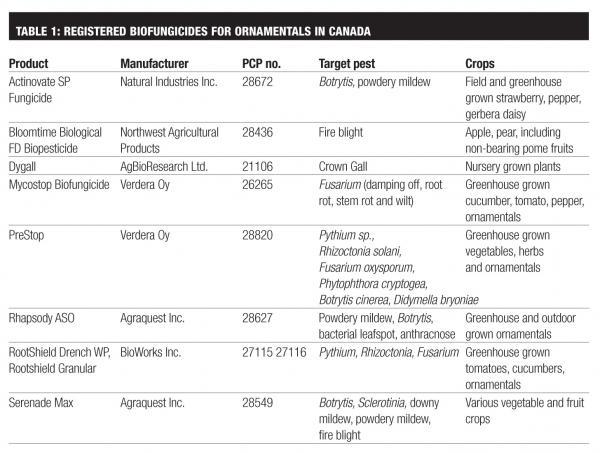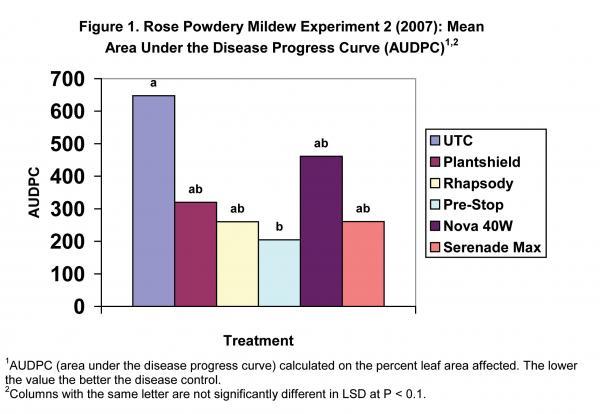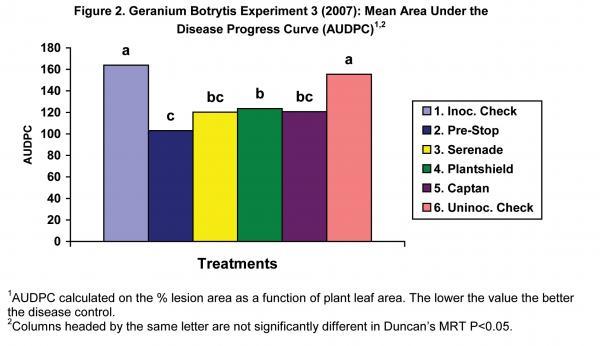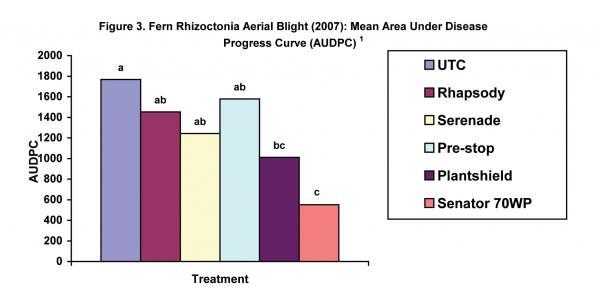January 1, 2012
Microbial-based pesticide testing in nurseries
BY PETER ISAACSON
National IPM/Minor Use Coordinator, CNLA
Nursery growers have identified the lack of access to newer, environmentally-friendly pesticide products as an impediment to adopting IPM strategies. While some reduced-risk and microbial products are becoming available in the Canadian marketplace (Table 1) pest management is still predominantly dealt with culturally and chemically. In 2006 the Canadian Nursery Landscape Association (CNLA) and Agriculture and Agri-Food Canada (AAFC) initiated a two-year research project to study the viability of microbial-based pesticides on ornamental nursery production. This research project was undertaken to start encouraging nursery growers to adopt these technologies and assist in reducing chemical pesticide use, and the risks associated with them. First year results were published in the March 2007 issue of Landscape Trades. This article will summarize the final year of testing.
Efficacy of biofungicides
In this project the biological fungicides Rootshield* (Trichoderma harzianum), Rhapsody (Bacillus subtilis) and Pre-Stop (Gliocladium cacatenulatum) were evaluated for efficacy and crop tolerance of powdery mildew on outdoor- and greenhouse-grown hybrid roses (2006-2007), Botrytis on geraniums (2006-2007) and Rhizoctonia aerial blight of maidenhair fern (2007). These results summarize the results from the 2007 growing season.
Rose powdery mildew experiments
All of the biological fungicides applied as a preventative spray every seven to 14 days reduced rose powdery mildew symptoms on one-gallon, container-grown outdoor hybrid roses compared to the untreated check, under moderate disease pressure. Pre-Stop (G. catenulatum) and Serenade Max (Bacillus subtilis) applied every 14 days, and Rhapspdy (B. subtilis) applied every seven days, performed as well as, or better than, the standard fungicide, Nova 40W (myclobutanil). Serenade Max left a white residue on the leaves which persisted after overhead watering, which may not be desirable in a commercial hybrid rose; however, no residue or injury was observed on flower petals. Plantshield (Rootshield), Trichoderma harzianum, was somewhat less effective under higher disease pressure at the end of trial. Differences between treatments were not statistically significant due to a high degree of variability within each treatment, including in the check and standard fungicide treatments. No symptoms of phytotoxicity were observed on any of the three hybrid rose cultivars in the trial.

Geranium botrytis blight experiments
Under moderate to high disease pressure, zonal geraniums cv. 'Bravo' and cv. 'Neon Violet' treated preventively (prior to inoculation) and every 14 days post-inoculation with pre-stop (Gliocladium catenulatum strain J1446) had significantly less Botrytis blight than the check plants or the plants treated with captan fungicide, and the highest plant quality rating. PRE-STOP reduced Botrytis lesion size, number of lesions and number of diseased leaves and provided control comparable to captan. Serenade Max (Bacillus subtilis QST 713), with the second highest plant quality rating, reduced the area under the disease progress curve (AUDPC) significantly compared to the untreated checks and provided a level of disease control comparable to captan. All of the biologicals: Pre-Stop, Serenade Max (Bacillus subtilis QST 713), and Plantshield (Rootshield), Trichoderma harzianum strain T-22, reduced the area under the disease progress curve (AUDPC) significantly compared to the untreated checks. No phytotoxicity was observed in any treatment.


Rhizoctonia aerial blight of fern experiments
Plantshield (Rootshield), Trichoderma harzianum Strain T-22, was the only biological fungicide that significantly reduced Rhizoctonia aerial blight of western maidenhair fern (Adiantum aleuticum) compared to the untreated check, under moderately high disease pressure. Disease control with Plantshield was not statistically different from that obtained with Senator 70 WP (thiophanate-methyl). Maidenhair fern is highly susceptible to Rhizoctonia aerial blight when grown in the greenhouse under high temperatures. All treatments were applied every 14 days in this trial. Serenade Max and Rhapsody (Bacillus subtilis MB 600) reduced disease to some extent also, and may have performed better on a 7-day schedule on this overhead-irrigated crop. Pre-Stop (Gliocladium catenulatum) was not effective on this disease.

Conclusions
In this project the biological fungicides Rootshield (Trichoderma harzianum), Rhapsody (Bacillus subtilis) and Pre-Stop (Gliocladium cacatenulatum) were evaluated for efficacy and crop tolerance of powdery mildew on outdoor and greenhouse grown hybrid roses (2006-2007), Botrytis on geraniums (2006-2007) and Rhizoctonia aerial blight of maidenhair fern (2007). On roses preventative sprays every 7-14 days with any of the three biological fungicides reduced powdery mildew symptoms when compared to the untreated checks. Each performed the same or better than the chemical standard Nova 40W (myclobutanil). Botrytis suppression on geranium was most successful using Pre-Stop when treated preventatively, and every 14 days. Pre-Stop reduced the number of Botrytis lesions and the number of diseased leaves and provided a level of disease control comparable to Captan. Plantshield (= Rootshield) was the only biological that significantly reduced Rhizoctonia aerial blight on western maidenhair fern and control was equivalent to Senator 70WP. None of the products showed phytotoxicity symptoms on the test plants.
We would encourage growers to try these products at least on a limited scale to better understand how they will be incorporated into production practices. It is important to note that most of these products act preventatively and will not compensate for poor growing practices. Growers must establish the environment that will allow healthy plant growth and reduce the need for fungicide sprays. Ensure you follow label directions carefully when using any pest control product.
Overall we have been very pleased with the research work conducted as a blend of efficacy data generation, demonstration trials and extension work. When informing growers of the trials the response has been generally positive, and the research data generated will help promote use of these biologicals among ornamental growers. Data generated through the course of this study has been sent to registrants to support registration efforts.
We would very much like to thank the growers who donated plant material and participated in these studies including NATS Nursery, Langley, B.C. and Bylands Nursery, Kelowna, B.C. Research trials were conducted by Dr. Zamir Punja, Simon Fraser University, Burnaby, B.C. and Dr. Janice Elmhirst, Elmhirst Diagnostics and Research, Abbotsford, B.C.
This work was supported by the Pest Management Centre of Agriculture and Agri-Food Canada, Pesticide Risk Reduction Program. Additional funding was provided by the Canadian Nursery Landscape Association.
*Please note that early trials were conducted with Plantshield which is not registered for use in Canada. Rootshield is currently registered for both aerial and drench applications.